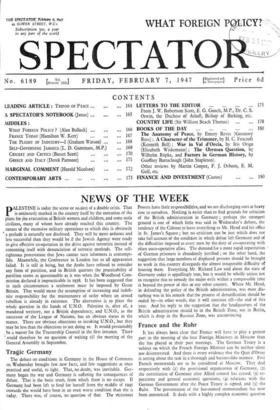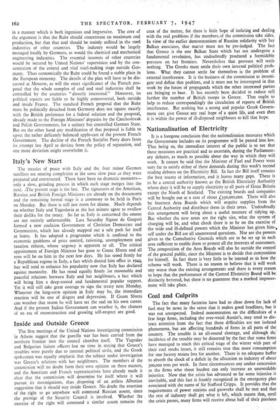France and the Ruhr
It has always been clear that France will have to play a greater part in the meeting of the four Foreign Ministers in Moscow than she has played at their past meetings. The German Treaty is a subject on which the French Foreign Minister can be neither silent nor disinterested. And there is every evidence that the Quai d'Orsay is setting about the task in a thorough and businesslike manner. Five French memoranda are to be considered at Moscow. They deal respectively with (I) the provisional organisation of Germany, (2) the constitution of Germany after Allied control has ceased, (3) re- parations and general economic questions, (4) relations with the German Government after the Peace Treaty is signed, and (5) the Ruhr. The presentation of the last-named memorandum has now been announced. It deals with a highly complex economic question in a manner which is both ingenious and impressive. The core of the argument is that the Ruhr should concentrate on maximum coal production, but that that coal should be mainly utilised in the steel industries of other countries. The industry would be largely managed locally by Germans, as would the chemical and mechanical engineering industries. The essential interests of other countries would be secured by United Nations' supervision and by the con- centration of the central and vital steel-making stage outside Ger- many. Thus economically the Ruhr could be found a stable place in the European economy. The details of the plan will have to be dis- cussed at Moscow, as will the exact significance of the French pro- posal that the whole complex of coal and steel industries shall be controlled by the countries "directly interested." Moreover, its political aspects are liable to be highly controversial, both outside and inside France. The standard French proposal that the Ruhr must be politically detached from Germany does not square exactly with the British preference for a federal solution and the proposal, already made to the Foreign Ministers' deputies by the Czechoslovak and Polish Governments, for a unitary but controlled German State. But on the other hand any modification of that proposal is liable to upset the rather delicately balanced apple-cart of the present French Government. The decline of the French Socialist Party dates from its attempt last April to deviate from the policy of separation, and one more deviation might overwhelm it.



































